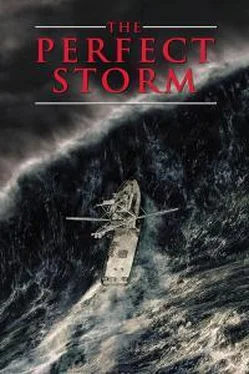Sebastian Junger - The Perfect Storm
Здесь есть возможность читать онлайн «Sebastian Junger - The Perfect Storm» — ознакомительный отрывок электронной книги совершенно бесплатно, а после прочтения отрывка купить полную версию. В некоторых случаях можно слушать аудио, скачать через торрент в формате fb2 и присутствует краткое содержание. Жанр: Триллер, Проза. Описание произведения, (предисловие) а так же отзывы посетителей доступны на портале библиотеки ЛибКат.
- Название:The Perfect Storm
- Автор:
- Жанр:
- Год:неизвестен
- ISBN:нет данных
- Рейтинг книги:3 / 5. Голосов: 1
-
Избранное:Добавить в избранное
- Отзывы:
-
Ваша оценка:
- 60
- 1
- 2
- 3
- 4
- 5
The Perfect Storm: краткое содержание, описание и аннотация
Предлагаем к чтению аннотацию, описание, краткое содержание или предисловие (зависит от того, что написал сам автор книги «The Perfect Storm»). Если вы не нашли необходимую информацию о книге — напишите в комментариях, мы постараемся отыскать её.
The Perfect Storm — читать онлайн ознакомительный отрывок
Ниже представлен текст книги, разбитый по страницам. Система сохранения места последней прочитанной страницы, позволяет с удобством читать онлайн бесплатно книгу «The Perfect Storm», без необходимости каждый раз заново искать на чём Вы остановились. Поставьте закладку, и сможете в любой момент перейти на страницу, на которой закончили чтение.
Интервал:
Закладка:
At 7:59 he pulls the probe release, extends it forward, and moves into position for contact. And then it hits.
Headwinds along the leading edge of the rain band are so strong that it feels as if the helicopter has been blown to a stop. Ruvola has no idea what he's run into; all he knows is that he can barely control the aircraft. Flying has become as much a question of physical strength as of finesse; he grips the collective with one hand, the joystick with the other, and leans forward to peer through the rain rattling off the windscreen. Flight manuals bounce around the cockpit and his copilot starts throwing up in the seat next to him. Ruvola lines up on the tanker and tries to hit the drogue, but the aircraft are moving around so wildly that it's like throwing darts down a gun barrel; hitting the target is pure dumb luck. In technical terms, Ruvola's aircraft is doing things "without inputs from the controls”; in human terms, it's getting batted around the sky. Ruvola tries as low as three hundred feet—"along the ragged edges of the clouds," as he says— and as high as 4,500 feet, but he can't find clean air. The visibility is so bad that even with night-vision goggles on, he can barely make out the wing lights of the tanker plane in front of him. And they are right—right—on top of it; several times they overshoot the drogue and Spillane thinks they are going to take the plane's rudder off.
Ruvola has made twenty or thirty attempts on the drogue— a monstrous feat of concentration—when the tanker pilot radios that he has to shut down his number one engine. The oil pressure gauge is fluctuating wildly and they are risking a burnout. The pilot starts in on the shutdown procedure, and suddenly the left-hand fuel hose retracts; shutting off the engine has disrupted the air flow around the wing, and the reel-in mechanism has mistaken that for too much slack. It performs what is known as an "uncommanded retraction." The pilot finishes shutting down the engine, brings Ruvola back in, and then reextends the hose. Ruvola lines up on it and immediately sees that something is wrong. The drogue is shaped like a small parachute, and ordinarily it fills with air and holds the hose steady; now it is just convulsing behind the tanker plane. It has been destroyed by forty-five minutes of desperate refueling attempts.
Ruvola tells the tanker pilot that the left-hand drogue is shot and that they have to switch over to the other side. In these conditions refueling from the right-hand drogue is a nightmarish, white-knuckle business because the helicopter probe also extends from the right-hand side of the cockpit, so the pilot has to come even tighter into the fuselage of the tanker to make contact. Ruvola makes a run at the right-hand drogue, misses, comes in again, and misses again. The usual technique is to watch the tanker's wing flaps and anticipate where the drogue's going to go, but the visibility is so low that Ruvola can't even see that far; he can barely see past the nose of his own helicopter. Ruvola makes a couple more runs at the drogue, and on his last attempt he comes in too fast, overshoots the wing, and by the time he's realigned himself the tanker has disappeared. They've lost an entire C-130 in the clouds. They are at 4,000 feet in zero visibility with roughly twenty minutes of fuel left; after that they will just fall out of the sky. Ruvola can either keep trying to hit the drogue, or he can try to make it down to sea level while they still have fuel.
We're going to set up for a planned ditching, he tells his crew. We're going to ditch while we still can. And then Dave Ruvola drops the nose of the helicopter and starts racing his fuel gauge down to the sea.
John Spillane, watching silently from the spotters seat, is sure he's just heard his death sentence. "Throughout my career I've always managed—just barely—to keep things in control," says Spillane. "But now, suddenly, the risk is becoming totally uncontrollable. We can't get fuel, we're going to end up in that roaring ocean, and we're not gonna be in control anymore. And I know the chances of being rescued are practically zero. I've been on a lot of rescue missions, and I know they can hardly even find someone in these conditions, let alone recover them. We're some of the best in the business—best equipped, best trained. We couldn't do a rescue a little while earlier, and now we're in the same situation. It looks real bleak. It's not going to happen."
While Ruvola is flying blindly downward through the clouds, copilot Buschor issues a mayday on an Air National Guard emergency frequency and then contacts the Tamaroa, fifteen miles to the northeast. He tells them they are out of fuel and about to set up for a planned ditching. Captain Brudnicki orders the Tam's searchlights turned up into the sky so the helicopter can give them a bearing, but Buschor says he can't see a thing. Okay, just start heading towards us, the radio dispatcher on the Tarn says. We don't have time, we're going down right now, Buschor replies. Jim McDougall, handling the radios at the ODC in Suffolk, receives—simultaneously—the ditching alert and a phone call from Spillane's wife, who wants to know where her husband is. She'd had no idea there was a problem and just happened to call at the wrong moment; McDougall is so panicked by the timing that he hangs up on her. At 9:08, a dispatcher at Coast Guard headquarters in Boston takes a call that an Air National Guard helicopter is going down and scrawls frantically in the incident log: "Helo [helicopter] & 130 enroute Suffolk. Cant refuel helo due visibility. May have to ditch. Stay airborne how long? 20-25 min. LAUNCH!" He then notifies Cape Cod Air Base, where Karen Stimpson is chatting with one of her rescue crews. The five airmen get up without a word, file into the bathroom, and then report for duty out on the tarmac.
Ruvola finally breaks out of the clouds at 9:28, only two hundred feet above the ocean.
He goes into a hover and immediately calls for the ditching checklist, which prepares the crew to abandon the aircraft. They have practiced this dozens of times in training, but things are happening so fast that the routines start to fall apart. Jim Mioli has trouble seeing in the dim cabin lighting used with night-vision gear, so he can't locate the handle of the nine-man life raft. By the time he finds it, he doesn't have time to put on his Mustang survival suit. Ruvola calls three times for Mioli to read him the ditching checklist, but Mioli is too busy to answer him, so Ruvola has to go through it by memory. One of the most important things on the list is for the pilot to reach down and eject his door, but Ruvola is working too hard to remove his hands from the controls. In military terminology he has become "task-saturated," and the door stays on.
While Ruvola is trying to hold the aircraft in a hover, the PJs scramble to put together the survival gear. Spillane slings a canteen over his shoulder and clips a one-man life raft to the strap. Jim Mioli, who finally manages to extract the nine-man raft, pushes it to the edge of the jump door and waits for the order to deploy. Rick Smith, draped in survival gear, squats at the edge of the other jump door and looks over the side. Below is an ocean so ravaged by wind that they can't even tell the difference between the waves and the troughs; for all they know they are jumping three hundred feet. As horrible as that is, though, the idea of staying where they are is even worse. The helicopter is going to drop into the ocean at any moment, and no one on the crew wants to be anywhere nearby when it does.
Only Dave Ruvola will stay on board; as pilot, it is his job to make sure the aircraft doesn't fall on the rest of his crew. The chances of his escaping with his door still in place are negligible, but that is beside the point. The ditching checklist calls for a certain procedure, a procedure that insures the survival of the greatest number of crew. That Mioli neglects to put on his survival suit is also, in some ways, suicidal, but he has no choice. His duty is to oversee a safe bailout, and if he stops to put his survival suit on, the nine-man raft won't be ready for deployment. He jumps without his suit.
Читать дальшеИнтервал:
Закладка:
Похожие книги на «The Perfect Storm»
Представляем Вашему вниманию похожие книги на «The Perfect Storm» списком для выбора. Мы отобрали схожую по названию и смыслу литературу в надежде предоставить читателям больше вариантов отыскать новые, интересные, ещё непрочитанные произведения.
Обсуждение, отзывы о книге «The Perfect Storm» и просто собственные мнения читателей. Оставьте ваши комментарии, напишите, что Вы думаете о произведении, его смысле или главных героях. Укажите что конкретно понравилось, а что нет, и почему Вы так считаете.












